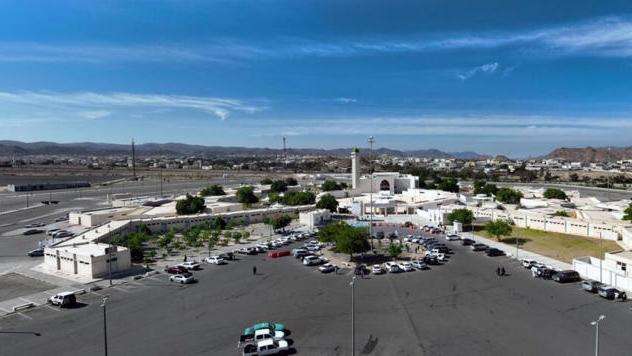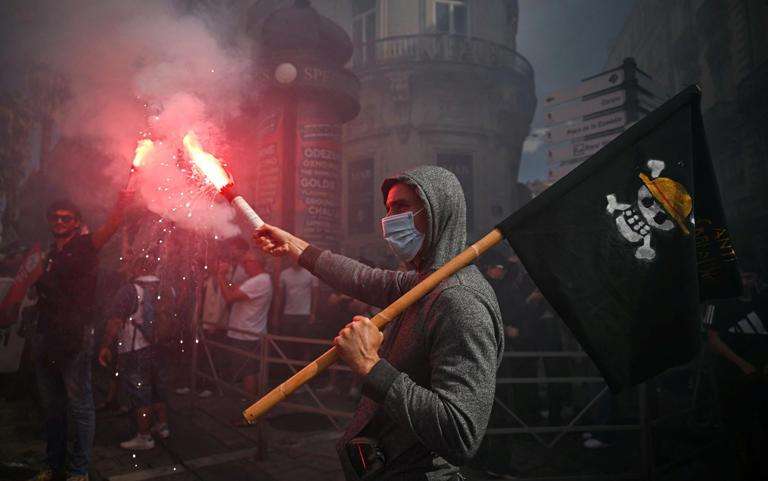The Italian government, led by Prime Minister Giorgia Meloni's right-wing coalition, has initiated its controversial "Albania model" by transferring a first group of rejected asylum seekers to a camp in Albania. This move marks a significant step in Italy's efforts to manage migration, but it also raises serious legal and humanitarian concerns, Daily Dazzling Dawn understand.
According to reports from ANSA news agency, an Italian navy ship transported 40 individuals to the port of Shëngjin, Albania, on Friday. These individuals, whose asylum applications were rejected within Italy, will now be housed in a camp in Albania until their eventual deportation. This development comes after a series of legal setbacks for the Meloni government's original plan, which aimed to process asylum applications in Albania before migrants even entered Italian territory. Court rejections forced the government to adapt its strategy, leading to the utilization of the Albanian camps as external repatriation centers.
Interior Minister Matteo Piantedosi has characterized the camp in Gjadër as "another repatriation centre, just outside Italian territory." This description highlights the government's intent to circumvent traditional repatriation procedures within Italy by outsourcing them to Albania. The decision to send rejected asylum seekers to Albania, rather than holding them in Italian repatriation centers, underscores the government's determination to implement its "Albania model," despite ongoing legal challenges.
The European Court of Justice is currently reviewing the legality of the "Albania model," focusing on whether Albania can be considered a "safe third country" for the purpose of deportations. This legal scrutiny is crucial, as it will determine the compatibility of Italy's policy with European law and human rights standards.
Bangladeshi Illegal Immigrants in Italy:
The presence of Bangladeshi illegal immigrants in Italy is a complex and often overlooked aspect of the broader migration issue. Many individuals from Bangladesh seek economic opportunities, leading them to undertake perilous journeys to Europe.
Estimated Numbers- It is difficult to provide a precise number of undocumented Bangladeshi immigrants in Italy. Estimates vary, and the clandestine nature of their presence makes accurate data collection challenging. However, it is widely acknowledged that a significant number exist, likely in the tens of thousands.
Factors that make it difficult to get accurate numbers are-Undocumented individuals are not counted in official statistics.
Migrant flows fluctuate- Individuals may move between countries within the Schengen Area.
Connection and Circumstances: Many Bangladeshi immigrants arrive in Italy via irregular routes, often facilitated by smuggling networks. They frequently work in the informal economy, taking on low-wage jobs in sectors such as agriculture, construction, and services. Community networks play a vital role in providing support and information to newly arrived immigrants. Some Bangladeshi immigrants have established communities in certain regions of Italy. They may face challenges such as exploitation, discrimination, and limited access to essential services.
The "Albania model" brings concern to these communities, as it creates a precedent for externalizing the handling of migrants, which may lead to more deportations, and harsher treatment.Their connection to the "Albania model" is that this new policy is creating a precedent that could be used against all illegal immigrants in Italy, including the Bangladeshi community. The model also creates a fear factor, that could drive more undocumented individuals further underground, making them more vulnerable to exploitation.
The "Albania model" represents a significant shift in Italy's migration policy, and its implications for all migrant communities, including those from Bangladesh, remain to be seen. The legal outcome of the European Court of Justice's review will be pivotal in determining the future of this controversial initiative.


_7.jpg)

_8.jpg)



.svg)

